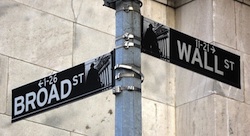The stock markets are often referred to as “the stock market”, as if it’s a single unified market.
The reality is that nothing could be further from the truth.
What we refer to as the stock market is actually a collection of markets, some domestic, some foreign.
What are the various stock markets, and why are they different?
The New York Stock Exchange, or NYSE
This is the largest stock exchange, not only in the US but also worldwide.
For this reason it’s often referred to as “The Big Board”. The exchange is open Monday through Friday (except legal holidays), from 9:30 a.m. to 4:00 p.m., New York time.
How big is the NYSE?
At the end of last year, total market capitalization of its listed companies exceeded $14 Trillion.
Though market trading is now mostly electronic, it is still possible to buy one of 1,366 “seats” on the exchange, which enables the holder to trade directly on the exchange trading floor. Though there are no literal seats on the exchange as there were in the 19th Century (which is where the term comes from), the licenses the NYSE sells to direct traders continue to be referred to in the same way.
The NYSE tends to include the stock of generally better known and more established companies. This is because the minimum financial requirements are higher than they are for the NASDAQ exchange.
The NASDAQ Market
 The National Association of Securities Dealers Automated Quotations, or NASDAQ, was the world’s first electronic stock market. For this reason, it was also referred to for much of its early existence as the over the counter market, or OTC.
The National Association of Securities Dealers Automated Quotations, or NASDAQ, was the world’s first electronic stock market. For this reason, it was also referred to for much of its early existence as the over the counter market, or OTC.
Today it’s the second largest stock exchange in the US by market capitalization.
Though requirements for a company to list its stock on the NASDAQ are less stringent than on the NYSE, NASDAQ still requires that a company is registered with the Securities and Exchange Commission (SEC), have at least three broker/dealers (market makers) and meet certain minimum financial asset requirements.
Though the stocks listed on the NASDAQ are typically smaller in market capitalization than those listed on the NYSE, some of those listed are among the largest companies in America. Many of them are also technology companies.
Related: Great Brokerages for Inexpensive Trades.
Foreign stock exchanges
Nearly every major country in the world has at least one stock exchange which performs the same function as the NYSE and NASDAQ do in the US. Some of the better known foreign exchanges include the following:
- London Stock Exchange
- Tokyo Stock Exchange
- Toronto Stock Exchange
- Paris Bourse
- Frankfurt Stock Exchange
- Shanghai Stock Exchange
- Singapore Exchange
- Hong Kong Stock Exchange
Because stock exchanges are all around the world, stocks trade 24 hours a day, seven days a week. One or more stock exchanges are open at any given time.
Non-stock exchanges
What works for stocks can also work for various other assets, financial and otherwise, and there are exchanges established to handle just about anything you can think of. Not all of them are formal exchanges in the sense that the NYSE and NASDAQ are. Though some may be based on stock prices, they aren’t stock exchanges strictly speaking.
Chicago Board Options Exchange (CBOE). This is an exchange for the trading of options, and it is the largest such exchange in the US.
Chicago Mercantile Exchange (CME). Sometimes referred to simply as “the Merc”, the CME is a derivative exchange for financial securities, currencies and commodities as well as a host of lesser known derivative types.
The “Bond Market”. The term is frequently used to describe trading in bonds (mostly government bonds) but there is no formal bond market set up in the way there is for stocks. Most bond trading is decentralized, handled between broker/dealers and large institutions. Some corporate bonds however are listed on various exchanges.
Why do you need to know about this?
Besides it being interesting (well to me at least), it’s useful to understand how stocks and financial securities work. The more you can learn about “stock” terminology the better equipped you are to make wise investment choices.
So the next time you hear someone say “did you see the market tank yesterday,” you can ask them which market they are referring to!
I use an online discount broker to buy from the Toronto Stock Exchange. Much easier, tax wise, to buy in Canada even though many of the companies operate world wide.
I have about ten years to go until retirement and I am concentrating on dividend paying stocks right now. My bank is offering 15 month GICs at 1.6% so I might as well take my chances in the market.
Whenever they show pictures of the floor doesn’t it just seem like chaos? I have no idea how it all worked prior to electronic trading…seems like people just screaming at each other!